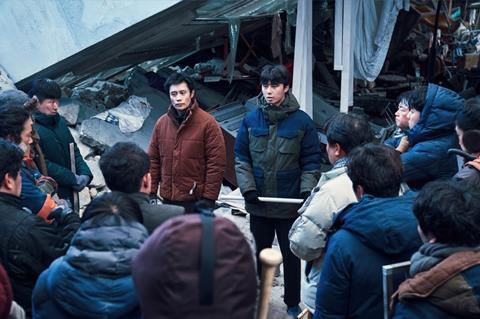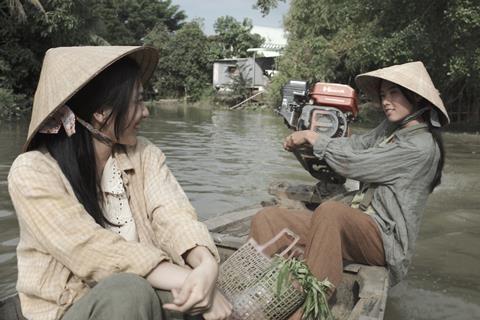Parasite and Drive My Car won the 2020 and 2022 international feature Oscars — but the Asia Pacific region failed to land a nomination at the 2023 awards. Screen assesses the chances of glory this time around.

The Asia Pacific region has something to prove going into this year’s international feature film Oscar race, having not secured a single nomination in 2023, despite four titles (from South Korea, Pakistan, India and Cambodia) making the 15-strong shortlist. The disappointing outcome followed a successful run in the category that saw South Korea’s Parasite and Japan’s Drive My Car win the award in 2020 and 2022 respectively. Entries are down this year to 18, from a total of 22 last time.
This number would have been higher but three submitted titles are understood not to be on the final list at time of press: Hong Kong’s A Light Never Goes Out, Kyrgyzstan’s This Is What I Remember and Tajikistan’s first entry in 18 years, Melody.
While Screen International has confirmed the status of two of these submissions, a question mark remains over Hong Kong’s entry. The debut feature of Anastasia Tsang premiered at Tokyo in 2022 and saw Sylvia Chang named best leading actress at last year’s Golden Horse Awards; Orchid Tree Media recently acquired North American rights. It would be the first time Hong Kong has not been in the running for the award since 2005, when Running On Karma was disqualified.
Surprise choice
Japan has entered Perfect Days by German filmmaker Wim Wenders, marking the first time the country has selected a non-Japanese director in more than 60 years of Oscar submissions and surprising many by passing over Hayao Miyazaki’s animation The Boy And The Heron.
Perfect Days premiered in Competition at Cannes, winning the prize of the Ecumenical jury and best actor for Koji Yakusho. The story follows a toilet cleaner in Tokyo who seems utterly content as he goes about his everyday routine, with a series of encounters gradually revealing more of his past. Perfect Days went on to screen at Toronto and received its Asian premiere as the opening film of Tokyo International Film Festival. Neon has US distribution rights to the feature, which quickly sold out for The Match Factory after its Cannes debut.
From Australia comes Shayda, executive produced by Cate Blanchett and the feature-directing debut of Noora Niasari. The Australia-set story follows an Iranian woman and her young daughter who seek refuge in a women’s shelter. Premiering at Sundance, the drama picked up the audience award in the world cinema dramatic competition and went on to screen at Locarno, Melbourne and Toronto. The cast is led by Cannes best actress winner Zar Amir Ebrahimi (Holy Spider), and Sony Pictures Classics will mount a US release from December 1. The backing of Blanchett may draw attention from US and international Academy voters.
Bhutan secured a nomination in 2022 with Lunana: A Yak In The Classroom, and its director Pawo Choyning Dorji is back with The Monk And The Gun. The drama centres on an American who attempts to acquire a rare Civil War-era rifle from a monk who wants something significant in return, set against the backdrop of Bhutan’s transition to democracy in 2006. The film, which premiered at Telluride before screening at Toronto, is only the third to be submitted by the country, located on the eastern ridges of the Himalayas. Roadside Attractions recently acquired US rights and plans a release in 2024.

Armenia has yet to make the shortlist after 12 entries, but is hoping to fare better this year with Amerikatsi by Michael A Goorjian. This comedy-drama follows an Armenian-American who, after being arrested on his return to Armenia, becomes fascinated with a couple he can see from his prison cell. The film premiered at Woodstock Film Festival, where it picked up best narrative feature and later won the audience award at Hamburg. Amerikatsi opened in New York and Los Angeles on September 8 through Variance Films, grossing almost $410,000 at press time.
South Korea, which made the 15-strong shortlist last year with Park Chan-wook’s internationally celebrated Decision To Leave, is represented this time by Concrete Utopia. The second film by director Um Tae-hwa is set in a Seoul that has been largely destroyed by a massive earthquake. One building remains standing among the wreckage, whose residents must fend off outsiders. Concrete Utopia was released locally in August, where it ranks as the third best-performing Korean title at the local box office, taking in $28.8m including Hong Kong and Vietnam. It also screened at Toronto and will receive a wide US release through 815 Pictures on December 15.
Four submissions from the region were first seen in Cannes this year. Alongside Perfect Days on the Croisette was Malaysia’s Tiger Stripes, a coming-of-age body horror that won the grand prize for best film in the Critics’ Week sidebar — a first for the Southeast Asian region. Amanda Nell Eu made her feature directing debut and was the first Malaysian female director ever selected for Cannes.
From Singapore, Anthony Chen’s The Breaking Ice premiered in Un Certain Regard and is the filmmaker’s third feature to be submitted after Cannes Camera d’Or winner Ilo Ilo and Wet Season, neither of which made the shortlist despite acclaim on the festival circuit. The Breaking Ice opened in mainland China on August 22, taking around $3.6m (rmb26m), and will be released in the US through Strand Releasing.
First seen in Directors’ Fortnight at Cannes was Zarrar Kahn’s horror film In Flames, which has been submitted by Pakistan. It centres on a mother and daughter confronting death, grief, toxic patriarchy and gendered violence in Karachi. It has been sold to several key territories including Canada, France and the UK by XYZ Films.
Venice Film Festival provided the launchpad for a brace of submissions from Asia Pacific. The festival’s Horizons sidebar premiered Mongolia’s City Of Wind by Lkhagvadulam Purev-Ochir, where leading man Tergel Bold-Erdene won best actor, before going on to screen at Busan and Pingyao film festivals.
Also debuting in Horizons, albeit in 2022, was Indonesian drama Autobiography by film critic-turned-director Makbul Mubarak, winning the section’s Fipresci award. The story of a young housekeeper and a retired general went on to be selected for more than 50 festivals and won a string of awards, including the grand prize at Tokyo Filmex and best screenplay at the Asia Pacific Screen Awards.
Autobiography was acquired by Prime Video for the Southeast Asia region, with streaming services helping expand international audiences for a number of this year’s submissions.
Taiwan’s Marry My Dead Body was made available around the world on Netflix from August 10, drawing 1.6 million views in five days. The supernatural comedy, directed by Cheng Wei-hao, premiered as the closing film of Taipei Golden Horse Film Festival in November 2022 and went on to become the seventh-highest-grossing local film of all time in Taiwan, taking $11.2m (nt$360m).
Big hitters

Further box-office hits to be selected for the category include India’s submission 2018, a survival thriller directed by Jude Anthany Joseph that became the highest-grossing Malayalam-language film of all time, taking more than $25m following its local release in May.
From China, The Wandering Earth II has picked up more than $600m since its release in January, of which $52m came from Imax screens, helping the big-screen format score a new box-office record over Chinese New Year.
Submissions that have picked up prizes on the festival circuit include Nepal’s Halkara, directed by Bikram Sapkota; the Philippines’ entry The Missing, an animated sci-fi by Carl Joseph Papa; and Vietnam’s Glorious Ashes, directed by Bui Thac Chuyen, which premiered at Tokyo International Film Festival in 2022.
Rounding out the submissions are Atta Hemwadee’s directing debut Not Friends from Thailand, a coming-of-age story from powerhouse studio GDH 559 (Bad Genius); and Mohammad Rabby Mridha’s No Ground Beneath The Feet from Bangladesh, which centres on a struggling ambulance driver and premiered at Busan in 2021 before going on to screen at Asia-focused festivals in London, Vienna and Barcelona.
























No comments yet